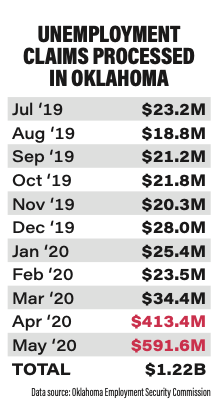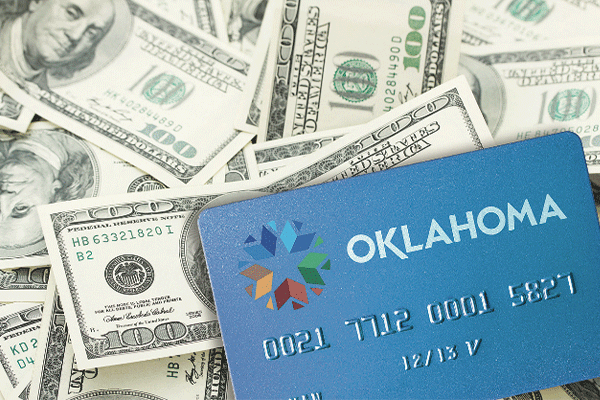
OKLAHOMA CITY – The state processed more than $1 billion in unemployment claims in the last two months – more than the total of all claims paid in 2018 and 2019 combined, the Oklahoma Employment Security Commission announced.
The OESC paid almost twice as much in claims in April ($413.4 million) than it did in the preceding nine months ($216.6 million).
The advance, unadjusted number of initial claims filed during the week that ended June 6 totaled 50,397, almost 10,000 fewer than the previous week’s revised level of 60,376. The unadjusted number of continuing claims totaled 150,084, which was 22,000+ fewer than the previous week’s revised number.
Nationally, the seasonally adjusted number of initial claims totaled 1,542,000, a decrease of 355,000 from the previous week’s revised level. However, new claims have exceeded one million for 12 consecutive weeks.
The U.S. Department of Labor estimated the nation’s unemployment rate at 14.4% during the week ending May 30.
The federal government reported June 11 that 21.5 million people are receiving unemployment benefits. More than 42 million individuals have applied for unemployment benefits since mid-March, although some have been rehired as many states, including Oklahoma, are reopening gradually.
“I know Oklahomans are facing tough decisions and some are still having issues with our system,” said OESC Interim Executive Director Shelley Zumwalt. “I want them to know we’re working on processing their claims day and night. We haven’t forgotten about you. We’re processing claims at a very high rate” but still have “a long way to go...”
67,000 CLAIMS PAID IN 9 DAYS
Between May 31 and June 8 the OESC paid 67,000 claims – an unprecedented number of claims that constituted $198 million in benefit payouts processed in a span of nine days, Zumwalt reported. That included Unemployment Insurance, Pandemic Unemployment Assistance, Federal Pandemic Unemployment Compensation, and Pandemic Emergency Unemployment Compensation.
Apparently the federal government is underwriting almost all of the unemployment benefits for the army of jobless workers in this state, because the impact of the economic crisis has barely touched Oklahoma’s unemployment fund. The state’s Unemployment Insurance Trust Fund is $347 million higher now than it was almost a year ago.
The trust fund balance on May 24 was a record $1.484 billion, the highest level in at least 22 years, OESC ledgers showed. In comparison, the trust fund balance on June 30, 2019, was $1.137 billion.
OESC COPING WITH 3 ISSUES
The OESC has had to wrestle with three major issues in trying to administer a tsunami of unemployment claims.
The cumulative number of Oklahomans filing unemployment claims has surpassed half a million, Zumwalt said June 4. “This shows the impact of business closures and job losses due to COVID-19, as well as the oil industry crisis, all of which continue to grip the Sooner State’s economy and families.”
More than 50,000 initial claims for unemployment assistance were filed in Oklahoma during the week that ended June 6. In contrast, prior to the current economic crisis the previous one-week record of initial unemployment claims was 9,778 filed one week in January 1991, OESC records extending back to 1987 reflect.
Also, “Much of our system is upwards of 40 years old,” said OESC Public Information Officer Jeff Fryer. “We have been implementing newer systems, but it can pose new challenges when working with the older system.”
Another issue with which the OESC is coping is fraud.
FRAUD IS WIDESPREAD
“We estimate more than 100,000 fraudulent claims have been identified and not paid out,” Fryer said on June 10. “This is, of course, a moving target as we identify more fraudulent claims every day.” Thousands of jobless workers who file genuine claims have had their identities hijacked by fraudsters.
Criminals are seizing on a surge in job losses to steal unemployment benefits from Americans across the nation.
Approximately 10% of unemployment insurance payments are “improper under the best of times, and we are in the worst of times,” Scott Dahl, inspector general for the U.S. Labor Department, told the U.S. House Subcommittee on Government Operations.
According to the Associated Press, security experts contend the bulk of the fraud appears to be committed by criminals who are using stolen data to make claims using someone else’s identity. Often the information has been obtained from prior data breaches or direct attacks on state systems.
Experts warn that if criminals have enough information to file unemployment claims, they have enough information to commit other acts of identity theft. Consequently, Americans need to protect themselves from additional harm by freezing their credit and monitoring their credit frequently for any irregularities.
They also should change passwords regularly, use two-factor authentication whenever possible to log into accounts, and be suspicious of offers that seem too good to be true, advised John Breyault, who manages the Fraud Center of the National Consumers League.


